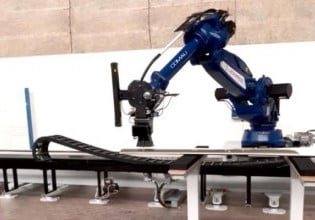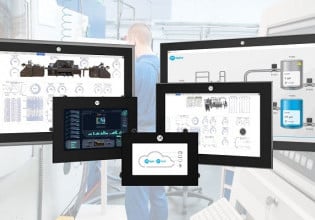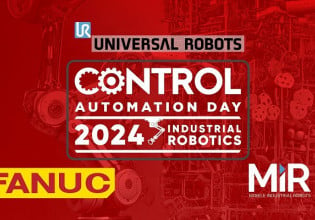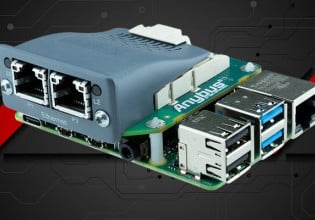How Can Big Data Play a Key Role in Digital Transformation?
Hear from several industry leaders about the future of digital transformation and the role big data plays in industrial automation.
The concept of "big data" is often mentioned when discussing the massive amounts of data needed to run an industrial facility. Some experts think big data is just a buzzword commonly heard in industry. Others believe big data is a challenge and are working to develop solutions to manage this type of data.
Big data is typically classified as a way to analyze complex data sets that are too large to organize with traditional data software or data processing tools. Big data is often associated with the term "digital transformation."
Digital transformation refers to the adoption of digital or smart technology by a company or industry. Digital transformation can happen when companies implement this technology into places such as oil & gas facilities, automotive manufacturing, and other areas of the industry.

A graphic showing what kind of data contributes to the concept of big data. Image used courtesy of IBM
While these terms are broad, they still hold weight in discussions about industry 4.0 and the future of industrial automation. The Control Automation editorial team recently discussed these high-level concepts with industry experts from IBM, Opto 22, and other companies making headway in the industrial automation market. This article will provide a more comprehensive breakdown of these terms according to these experts.
IBM Pushing for Digital Manufacturing Solutions
IBM has been around since 1911. They are most recognizable for their cloud and IT-based solutions. In recent years, IBM has focused more on Industry 4.0 and accelerating digital transformation. In September 2020, IBM announced a partnership with Red Hat and Schlumberger to promote cloud solutions in the oil & gas industry.

IBM's Watson platform aims to accelerate operational performance in the oil & gas industry. Image used courtesy of IBM
Earlier this year, IBM also partnered with Siemens and Red Hat to launch a hybrid cloud initiative. This initiative aimed to provide a flexible, open, and secure way for OEMs and plant managers to drive real-time value from operational data.
Manish Chawla, Global GM of IBM's Industrial Sector, provided a breakdown of big data with the idea of the four V's of big data. He classified these V's as the following:
- Volume
- Variety
- Velocity
- Veracity
Chawla mentioned that experts often also refer to it as five V's, with value as the fifth V. This breakdown could potentially help engineers and industry experts understand the actual meaning of big data.
A recent report from IBM revealed that a single manufacturing site could generate more than 2,200 terabytes of data in one month. However, an IDC report ("Future of Intelligence: Insights at Scale, Jan 2020") also found that 90% of potentially useful data is not analyzed.
IBM is just one of the companies in this space pushing big data and digital transformation into new technologies through their partnerships and innovations.
Opto 22 and Digital Transformation
Opto 22 was founded in 1974 by engineers who designed solid-state relays. Now, the company manufactures a variety of solutions for control system engineers and automation experts. Some of their more popular products include the groov RIO, groov EPIC, and MQTT resources.

Opto 22's groove EPIC. Image used courtesy of Opto 22
For those looking to adopt digital transformation in their facility, the burning question can be "where do you start?"
Benson Hougland, VP of Marketing & Product Strategy for Opto 22, elaborated on how engineers can jump-start the digital transformation process.
Hougland mentioned, "While it's tempting to dive in deep, adopt a platform, and jump into your digital transformation project, I strongly suggest starting small. Pick a few points of data to address a specific problem, and use vendor free-trial software and demo gear to bench-test a solution. Once you get a win, take the next steps with the workable solutions, and then scale up."
Hougland also stressed the importance of data democratization. This term is often associated with digital transformation and makes digital information accessible to an average user. This idea of starting small could help companies get a firm grasp of what digital transformation means for them and their facility.
The "average user" refers to someone who is not necessarily a software engineer or an IT expert.
Hougland elaborated on data democratization by stating, "One of the key drivers for IIoT implementations is data democratization, which means getting OT data where it's needed, without a lot of hassle. Think of where you're using clipboards or Excel now. Can that data be acquired automatically, and fed to the people and systems that need it? You'd be surprised how quickly you can streamline operations using simple data acquisition methods that help you better understand the bottlenecks in your processes."
Opto 22 continues to create technology that may give companies the extra nudge they need to adopt digital transformation in their facility. IBM and Opto 22 are not the only companies trying to help the industry define these terms. Rockwell Automation has also created several resources on how to use big data.
Rockwell Automation's Guide to Big Data
Rockwell Automation develops products ranging from PLCs to hardware to distributed control systems. In recent years, Rockwell Automation has shifted efforts towards digital transformation, focusing on the concept of structured data. Industrial systems have data that streams continuously from devices such as sensors, controllers, databases, and industrial computers.
The idea of structured data can help organize these massive data sets, making them easier to analyze from an engineer's perspective. Rockwell Automation is aiming to transform this data with a few solutions.
They've released several resources on their site about how manufacturers can utilize digital technology to improve operational efficiency. One solution is called the Connected Enterprise. This platform is designed to combine different networks in a factory to create one common platform. This solution turns all types of large data sets into actionable insights. Organizing this data can help engineers manage problems that arise with big data.

Rockwell's Connected Enterprise platform. Image used courtesy of Rockwell Automation
In a news release earlier this year, Chief Revenue Officer (CRO) at Rockwell Automation, Scott Genereux, mentioned, "With an expanding portfolio of technologies that spans SaaS, cloud, machine learning, and data analytics innovations, Rockwell Automation is at the forefront of industrial digital transformation."
Comapnies like IMB, Opto 22, and Rockwell are continuing to develop technology that promotes digital transformation. As industrial automation advances, it seems as though terms like digital transformation and big data might be here to stay.
What are your thoughts on these terms? Do you think big data plays a key role in advancing digital transformation?






